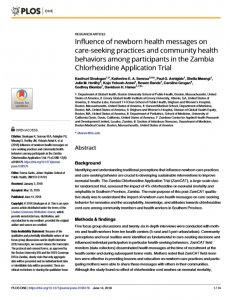
Abstract
Background
Identifying and understanding traditional perceptions that influence newborn care practices and care-seeking behavior are crucial to developing sustainable interventions to improve neonatal health. The Zambia Chlorhexidine Application Trial (ZamCAT), a large-scale cluster randomized trial, assessed the impact of 4% chlorhexidine on neonatal mortality and omphalitis in Southern Province, Zambia. The main purpose of this post-ZamCAT qualitative study was to understand the impact of newborn care health messages on care-seeking behavior for neonates and the acceptability, knowledge, and attitudes towards chlorhexidine cord care among community members and health workers in Southern Province.
Methods & findings
Five focus group discussions and twenty-six in-depth interviews were conducted with mothers and health workers from ten health centers (5 rural and 5 peri-urban/urban). Community perceptions and local realities were identified as fundamental to care-seeking decisions and influenced individual participation in particular health-seeking behaviors. ZamCAT field monitors (data collectors) disseminated health messages at the time of recruitment at the health center and during subsequent home visits. Mothers noted that ZamCAT field monitors were effective in providing lessons and education on newborn care practices and participating mothers were able to share these messages with others in their communities. Although the study found no effect of chlorhexidine cord washes on neonatal mortality, community members had positive views towards chlorhexidine as they perceived that it reduced umbilical cord infections and was a beneficial alternative to traditional cord applications.
Conclusion
The acceptability of health initiatives, such as chlorhexidine cord application, in community settings, is dependent on community education, understanding, and engagement. Community-based approaches, such as using community-based cadres of health workers to strengthen referrals, are an acceptable and potentially effective strategy to improve care-seeking behaviors and practices.
Access the original article and any supplementary material here.